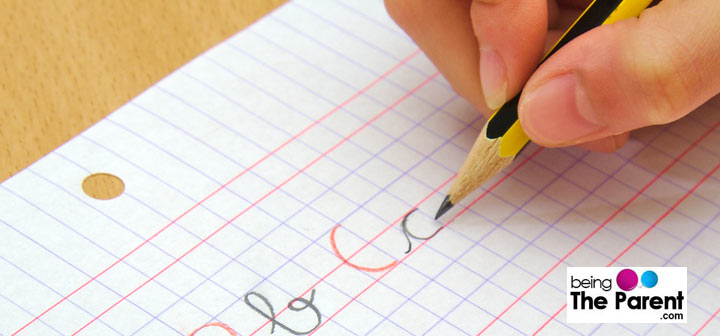
As your kid starts trotting to the school, he engages in a variety of new tasks. He’s suddenly chirping about the lunch box, tries to scribble and recites rhymes. You are probably overjoyed with listening your little one speak and express himself to you. More often than not, writing skills are overlooked at this stage, which actually is a crucial factor for developing effective communication skills. Writing involves perfecting multiple skills at the same time from holding a pen or pencil to forming letters, and then words.
- How to hold the Pencil Correctly?
- Tips to hold the Pencil Correctly
- Developing Writing Skills in Children
- Tips to develop Writing Skills in Children
How to hold the Pencil Correctly?
The first and major thing to teach your kid is holding the pencil in a correct way. If not done as a first, your child may never hold the pencil correctly all through his life. The way one holds and grips a pencil has its impact on the handwriting, making it even more crucial to learn how to hold a pencil correctly. To make it easier for you, we have compiled 3 tricks that will help you and your kids get the grip and position of holding a pencil.
Tips to hold the Pencil Correctly
- Use shorter pencils: A shorter pencil forces the kids to pinch with the thumb and index finger. It is for this reason that toddlers are given crayons broken in half
- Teach pinch and flip: If short pencils are not working for you, pinch the pinch the sharpened end of the pencil and then flip it around until it gently rests in the “webspace” (that soft skin between your thumb and index finger) in the ready position
- Let the last two fingers hide something!: In case none of the above seem to be working in your child’s case, try hiding something under his pinky and ring finger making these two fingers bend towards the palm while the other fingers and the thumb get working. A cotton or playdough ball, bead or a marble might do the trick

Developing Writing Skills in Children
Parents can make a big difference in helping their child develop writing skills by encouraging writing activities that are simple and fun.
Tips to develop Writing Skills in Children
1. Start smart:
Habits formed early in life are usually difficult to break later. Be consistent from the beginning and follow the rule of writing diligently.
- Use special books with blocks for writing numbers and four line copies for neat cursive writing
- Encourage phonetic writing
2. Teach basic writing-hygiene:
Let your kid comprehend that the word/sentence is always written from the left to right. Maintain a gap of the little finger between two words, etc.
3. Don’t make him sit for hours:
Young kids are not capable of sustaining attention for longer durations. Give him a break every 10 minutes. Do not let writing practice get monotonous and long or he will lose interest in writing
4. Develop mnemonics:
If your tot has difficulty writing some alphabets, resort to mnemonics. For instance, Y as a necktie, D as double bubble. This will allow him to visualize and associate alphabets
5. Inculcate writing discipline:
Provide him with a comfortable chair and table. Encourage your kid to write on a table. Ensure sufficient lighting. You may even buy those specially designed for kids. Make sure he’s not disturbed by the TV or phone. Watch out for good posture. He should not be slouched on the book. Provide him with sharpened pencils, eraser, ruler and a handkerchief. Keep him organised

6. Introduce the concept of revision:
Explain how he uses trial rooms in a fashion store to check and improve his appearance. Similarly, checking the homework for errors will reinforce the skills learned at school. Write – check – improvise!
7. Get him to write more:
Writing is a process of communication that plays an important role in your child’s life—both in and out of the classroom.
- Inspire him to maintain a daily diary/travel
- Log let him write thoughts on board
- Prepare grocery list
- Send cards
- Gift him activity, writing books
8. Get attractive sticky notes:
Nothing better than motivating and surprising your kid with these little stickies. Leave notes in his lunch box, next to the pillow or in the cupboard. And you may expect one for you in the kitchen requesting to make his favorite pudding
9. Get him a blackboard/whiteboard/slate:
Novelty stimulates interests and creativity. A toddler can be given these writing pads when they scribble and want to erase and practice more. This also proves to be a very cost effective choice
10. Pass on the writing:
Audience is a big part of motivation. Make your child write on greeting cards on festivals, or letters to friends and relatives. Send your kid’s letters/postcards/essay to his grandparents or aunts and let him receive letters of praises. Make sure that he does get responses, though
11. Sneak play into writing:
Don’t let your child give up on writing tasks because they’re “boring” and difficult. Do not make it another ‘school chore’ for him. Spark his interest in writing at home with engaging, fun activities.
- Play writing games such as grapevine (in which everyone writes one sentence of the story)
- Use finger paints: the feel of textures and colors gives an aesthetic boost

12. Encourage him to copy:
Encourage your kid to copy the lyrics of his favorite song, poetry or quotation. Ensure neatness and appropriate alignments
13. Tame that tantrum:
If your kid whines for something, direct him to first put on paper what he wants. This will simultaneously cool the moment and reinforce writing skills
14. Sharpen his motor skills:
If the pencil slips frequently or your kid has sweaty hands, then consider buying rubber grips. Develop dexterity by engaging him in tasks such as peeling and sticking stickers, pouring milk and putting away the dishes
15. Be a role model:
Let your child see that he’s not the only one making writing efforts. Show that you also write, in your daily routine. Show him your diary or expense book. Explain how writing is pleasurable and important
In the beginning, many kids write reverse alphabets. And some may take quite a time, dawdle and fiddle with book and test pencil’s sharpness. Don’t panic! It’s not dyslexia. Writing is a complex process, which involves thinking. Be patient! Your child may be thinking. The best way to improve writing skills is through regular practice. Indulge him in writing daily. Lastly, encourage, guide and provide him with feedback to prepare a good, confident writer!
